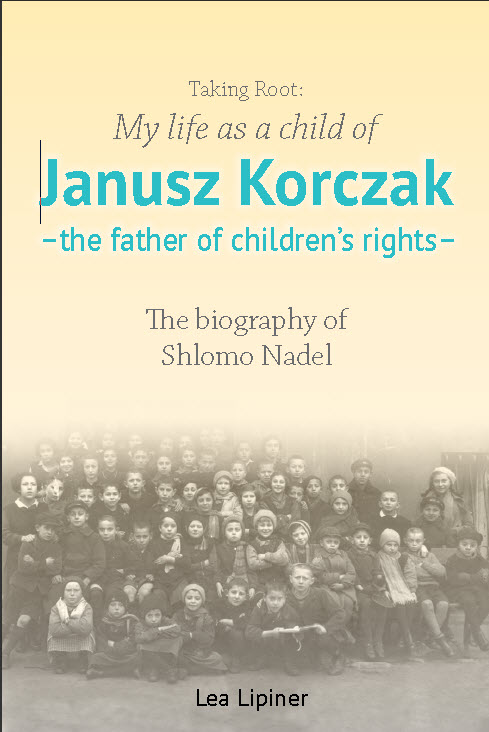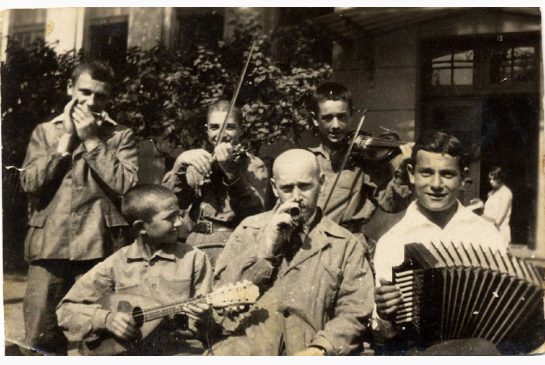
On December 29, 2015, Toronto Star published an account of the book launch of Lea Lipiner’s biography of Shlomo Nadel.
Below is the copy of the article by May Warren.
Provincial advocate hopes lessons can be learned from Janusz Korczak’s ‘republic of children’
Provincial Advocate Irwin Elman hopes Korczak’s philosophy will inspire the province
Shlomo Nadel. / Courtesy of the Janusz Korczak Association of Canada
Janusz Korczak and a few of the children under his care playing musical instruments. This is one of the photos taken by Shlomo Nadel while he was at the orphanage.
By: May Warren Staff Reporter, Published on Tue Dec 29 2015
There once was a place where orphans ran their own court, newspaper and senate. It was a place where children felt not only loved but respected, and had some measure of control over their own lives.
This “republic of children” did not exist in a fairy tale or a utopia, but in one of the darkest places in human history, behind the walls of the Warsaw ghetto during the Holocaust.
It was the creation of Polish pediatrician and educator Janusz Korczak, better known in Europe for his contributions to child philosophy and considered to be the father of children’s rights.
It’s a philosophy Ontario’s child advocate, Irwin Elman, hopes will rub off on the government and influence how children in care of the province are treated.
His office, along with UNICEF, has released a new biography of one of the last surviving children of Korczak’s care, on International Human Rights Day.
“To my core I believe that in many of the places in which we have young people live, particularly young people in care, they do not find the inspiration, the love, the support, the voice, that children in Korczak’s orphanage had,” Elman told the Star.
“He was able to inspire these young people in very desperate, difficult situations.”
“If he can do that then, how can we learn to do that now, in not such a desperate, dark time?’
The book, available for free download from the Provincial Advocate’s website was written by Lea Lipiner, a close family friend of surviving orphan Shlomo Nadel, who managed to escape Warsaw in 1939.
Elman said he intends the book as a “softer sell” to the government to do better.
“Don’t tell me you can’t legislate love. It is possible,” he said.
Korczak was born to Jewish parents in Warsaw in the late 19th century. After becoming a pediatrician and serving in the Russian army, he turned his attention to the welfare of the orphans of the city, lecturing and writing prolifically about his unique philosophy: That every child has his or her own path, and it’s the role of adults to help children achieve their own goals.
Korczak’s orphans had beds to sleep in, nutritious food to eat and medical care. But they also had music lessons and their own empowering child-run institutions.
In August 1942, the Nazis came to deport about 200 Jewish children from the orphanage to the Treblinka concentration camp.
The Nazis offered Korczak a reprieve, but he refused to leave the children. In a now-famous moment, they marched together to the train station and boarded the cattle cars for the camp. They all died there.
In one witness account from the period, as described in the book, even military personnel stood and saluted as Korczak and his orphans passed.
Jerry Nussbaum, president of the Janusz Korczak Association of Canada, said the act of heroism was completely in character for the doctor.
“He knew many people outside the ghetto, and many times they offered to smuggle him out,” Nussbaum said.
“For him it was out of any question to leave his children.”
The biography was originally published in Hebrew in 2013.
Author Lipiner said Nadel, who is now in his 90s and doesn’t speak English, tried his whole life to tell the story of Korczak.
“He called (it) Heaven on Earth,” she said.
Nadel lives in Israel and become a professional photographer after being encouraged to take pictures under Korczak’s care.
Marv Bernstein, chef policy adviser for UNICEF Canada, said a lot of Korczak’s philosophy can be found in the United Nations Convention on the Rights of the Child, but many people have never heard of him.
“I think a lot of the inspiration was taken forward, and the country that really moved the most proactively to encourage the adoption of the convention was Poland,” he said.
“I think it was because of the rich experience and legacy left by Janusz Korczak.”
